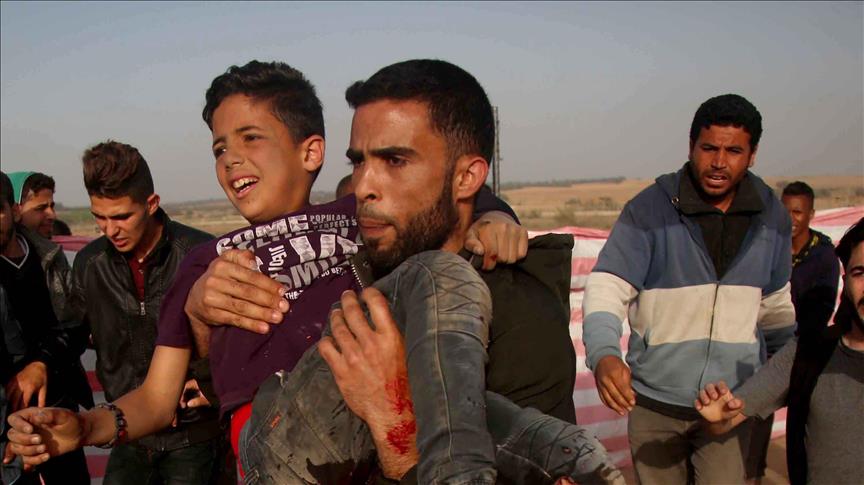Gaza protesters face bone-breaking bullets, mystery gas
Israel is using deadly new weapons against Palestinian protesters on Gaza’s border, local medical sources say
 A Palestinian carries a wounded boy as Palestinians clash with Israeli soldiers in response to Israil's intervention as part of the "Great March of Return" demonstration at the Al Bureij Refugee Camp in Gaza City, Gaza on April 17, 2018. ( Hassan Jedi - Anadolu Agency )
A Palestinian carries a wounded boy as Palestinians clash with Israeli soldiers in response to Israil's intervention as part of the "Great March of Return" demonstration at the Al Bureij Refugee Camp in Gaza City, Gaza on April 17, 2018. ( Hassan Jedi - Anadolu Agency )
Gazze
By Hidayah al-Saidi, Ali Abo Rezeg
GAZA CITY, Palestine
The Israeli army appears to be using new weapons -- including exploding bullets and mysterious gases -- against Palestinian protesters on the Gaza Strip’s eastern border.
With a view to determining the exact nature of these weapons, Anadolu Agency spoke to local medical sources and injured Palestinian protesters.
Dr. Ashraf al-Qidra, a spokesman for Gaza’s Health Ministry, confirmed that Israel was using a deadly new form of ammunition that causes grave bodily damage.
“The bullets we’re seeing now are the deadliest the Israeli army has ever used,” al-Qidra told Anadolu Agency. “This ammunition can cause massive damage to the bodies of victims, frequently resulting in death.”
Exploding bullets
“These bullets, which our medics have yet to identify, can affect bone, muscle, arteries and other organs,” al-Qidra said.
Victims of these bullets, he explained, are completely incapacitated -- if they survive at all -- and usually require extensive surgery.
“The bullet penetrates the body and explodes inside, damaging multiple organs -- not just the targeted area,” al-Qidra said.
“Such ammunition is banned internationally, but Israel continues to use it against peaceful demonstrators,” he added.
Fahad Zuhd, 28, has been in hospital for the last two weeks after having been shot in the leg while taking part in Gaza’s ongoing border protests.
When he was shot, Zuhd told Anadolu Agency: “I saw my knee explode; I lost 8.5 centimeters of bone while the blood vessels and arteries in my leg were ruptured.”
“When I arrived at the hospital, I had only three and a half units of blood due to severe hemorrhaging,” the young man recalled.
Zuhd has since undergone several surgical operations aimed at replacing the bone destroyed by the bullet.
Another victim of this deadly new bullet was Palestinian journalist Yasser Murtaja, who had been covering the rallies on April 6 when he was shot in the abdomen by an Israeli sniper.
Murtaja died shortly afterward when the bullet exploded in his abdomen, destroying his spleen, colon and liver.
Mystery gas
Al-Qidra also noted a second deadly new weapon now being used by the Israeli army: a mysterious gas that has caused hundreds of protesters to suffer temporary asphyxia and show other unusual symptoms.
“We still don’t understand the exact nature of this gas,” he said. “All we know is that it causes violent convulsions, vomiting, coughing and rapid heart rates.”
“Dozens of people exposed to this gas have returned to the hospital after experiencing rapid health deteriorations,” he added.
“It’s much more dangerous than teargas; it causes never-before-seen symptoms and probably leads to future health complications,” al-Qidra explained.
While taking part in the border rallies two weeks ago, Ali Sharif, 31, suffered temporary asphyxia from gas inhalation while also being shot in the leg.
Since then, he has been receiving treatment at Gaza City’s Shifa Medical Complex.
“After they fired gas bombs at us, I was paralyzed and couldn’t breathe. My eyes were burning,” Sharif told Anadolu Agency.
“Doctors later diagnosed me with a stomach ulcer,” he said. “For the next week, I couldn’t eat without vomiting.”
Activists, meanwhile, have posted footage online showing young protesters experiencing severe convulsions after having been exposed to the gas.
Since the border rallies began almost three weeks ago, at least 35 Palestinians have been killed -- while hundreds more have been injured -- by cross-border Israeli gunfire.
According to al-Qidra, most of these deaths were caused by exploding bullets.
The rallies are part of a six-week demonstration that will culminate on May 15. That day will mark the 70th anniversary of Israel's establishment -- an event Palestinians refer to as the “Nakba” or “Catastrophe”.
Demonstrators demand that Palestinian refugees be granted the “right of return” to their homes in historical Palestine from which they were driven in 1948 to make way for the new state of Israel.








